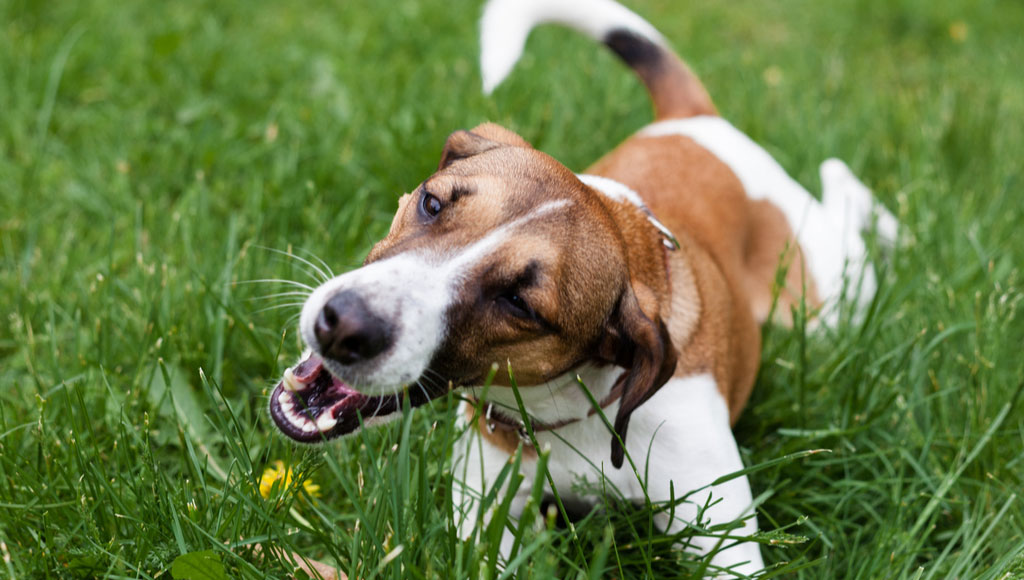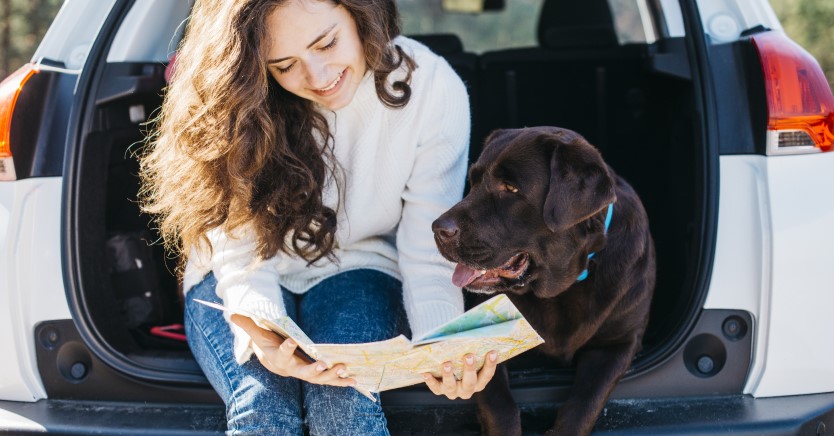Why Do Dogs Eat Grass (and Should I Be Worried if He Does)?
Learn about several potential reasons experts say your dog is eating grass.

Dogs do funny things; it's one of the reasons people love them so much. Sometimes those "funny things" don't seem so funny, though. If you've ever found your dog chewing on grass like your lawn is a giant buffet table, it may have given you pause. You've likely heard a few theories on why dogs do this. While experts don't have a definitive answer for why dogs eat grass, they've determined several potential reasons, most of which are harmless.
Biological Basis
One theory suggests that your dog is just following the evolutionary path set by his undomesticated ancestors. Wild and undomesticated dogs are omnivores, meaning they eat both meat and plants. Your dog may simply be eating grass as a means of keeping plants in his diet. Similarly, undomesticated canines likely consume plant material found in the stomachs of the animals they're eating. Your dog may have an instinctual "taste" for grass as a result.
Nutritional Needs
Most commercially produced dog food is plant-based, so your dog shouldn't need to eat grass to fulfill its biological desire for plant material. However, grass is high in fiber. If your dog has experienced digestive issues and you subsequently find him munching a lot on grass, it may indicate a fiber deficiency. Talk to your veterinarian about switching his food to a high-fiber option to see if that eliminates his grass-eating habits.
Stomach Problems
One of the most common theories for a dog's desire to eat grass is to settle an upset stomach. When a dog appears frantic to gobble down grass and follows that by throwing up, it seems reasonable that he used the grass to induce the vomiting. However, most experts don't believe that a dog has the foresight or intelligence to know that eating grass will fix their intestinal discomfort. Studies show that of the dogs who eat grass, a small percentage of them vomit after, suggesting the behavior isn't done to aid an ailing stomach.
While most dogs aren't consciously eating grass to provoke vomiting, some researchers believe it's possible that some do it as another biological instinct. Wolves are known to eat grass when they have intestinal parasites, as grass helps move the parasites out. Although most domesticated dogs are treated for worms, this may be a behavior that has stayed with them.
Psychological Reasons
Boredom
As with many concerning behaviors, eating grass may be a sign of boredom in your dog. Especially if your dog is left in the yard on his own for extended periods, chomping on grass could simply be a way to pass the time. If you must leave your dog alone, be sure he has safe and engaging toys to hold his attention. Puzzle balls and treat-dispensing toys are great ways to entertain your solitary pup. Rotate toys so your dog isn't playing with the same items every day. The limited access to them makes the toys more exciting. Exercise also helps alleviate boredom. Physical activity with you before you leave not only occupies your dog's mind, it also makes him tired and less likely to get into trouble while you're gone.
Loneliness
Similarly, loneliness can lead to inappropriate behaviors by dogs. Even when you're with your dog, if you aren't paying attention to him, he may resort to eating grass to get you to interact with him. Redirect this behavior to an appropriate activity, like a chew toy or a game of fetch. When he engages in the proper behavior, reward him with your praise and a small treat.
Separation Anxiety
Some dogs suffer from anxiety. Eating grass may be a self-soothing response to this. If your dog is well exercised and has plenty of interesting toys and activities to occupy him in your absence, but he still eats grass, he may have separation anxiety. Try leaving an old clothing item with your scent for him to snuggle while you're away.
Loneliness, anxiety, and boredom may all be relieved by taking your pup to doggie day care. The physical activity and companionship may alleviate any desire to eat grass.
When to Worry
If you notice your dog eating grass and throwing it up, be on the lookout for these additional symptoms: a lack of energy, diarrhea, or weight loss. This combination of issues could indicate a gastrointestinal problem. Your veterinarian should do an examination, including fecal and blood tests, to determine if your dog has inflammation, blood loss, internal bleeding or liver or pancreas problems. All of these affect the gastrointestinal tract and treatment may eliminate the grass-eating behavior.
Even though most dogs eat grass for harmless reasons - they like the taste or texture, they're acting on instinct, it gets your attention - there is the danger of ingesting toxic pesticides and herbicides. If you don't know whether the grass your dog is grazing on is treated, get him away from it immediately. It's also possible to get parasites like hookworms or roundworms when a dog eats grass that was in contact with contaminated waste from another animal.
The bottom line is that eating grass is generally not dangerous to dogs. But, as a responsible pet parent, you need to pay close attention to your dog's behavior regarding it. Never let him eat grass that you aren't certain is free of chemicals or other animal waste. If he does, or if you notice he eats grass in conjunction with other troubling symptoms, contact your vet for a workup. If he just seems to enjoy sampling a little of the lawn from time to time, you're probably safe to chalk it up to another weird thing your dog does.
Ready to start saving money on pet wellness care?
Then take a look at Mint Wellness, the pet wellness plan that provides fast reimbursement on routine pet care. Save on vaccinations, wellness exams, preventatives, dental, and more!
Learn More


